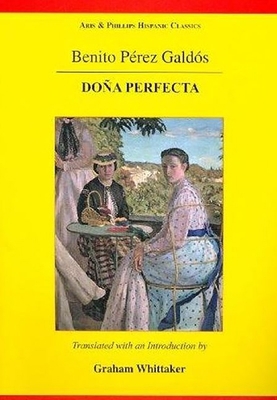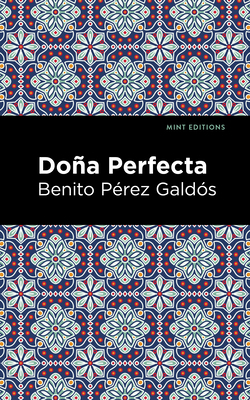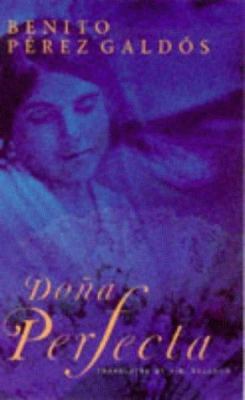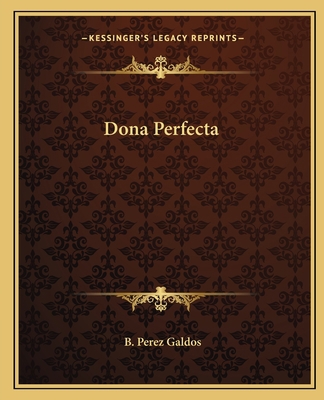All Formats & Editions
![Do~na Perfecta [Spanish] 8437603722 Book Cover](https://i.thriftbooks.com/api/imagehandler/l/AF6EBF213C1A9CCE18424F644078092EC36CC08C.jpeg)
Do~na Perfecta [Spanish]

Doña Perfecta
Do?a Perfecta (1876) is a 19th-century realist novel by Benito P?rez Gald?s from what is called the first of Gald?s's three epochs in his novels of social analysis. The action occurs in 19th century Spain, when a young liberal named Don Jos? (Pepe) Rey, arrives in a cathedral...
![Doña perfecta (Spanish Edition) [Spanish] 198112036X Book Cover](https://i.thriftbooks.com/api/imagehandler/l/74AF5047DEA2D5AC2240F7A5D25415EC7854D80E.jpeg)
Doña perfecta (Spanish Edition) [Spanish]
![Dona Perfecta: (Spanish Edition) [Spanish] 1545016224 Book Cover](https://m.media-amazon.com/images/I/41LniICAoeL._SL500_.jpg)
Dona Perfecta: (Spanish Edition) [Spanish]
![Doña perfecta (Spanish Edition) [Spanish] 1986642178 Book Cover](https://i.thriftbooks.com/api/imagehandler/l/B6FAD4828715B71CCD57CB048DF4E12B4CE72D9C.jpeg)
Doña perfecta (Spanish Edition) [Spanish]
![Dona Perfecta [Spanish] 158977017X Book Cover](https://m.media-amazon.com/images/I/51MxuNZtHhL._SL500_.jpg)
Dona Perfecta [Spanish]
![Dona Perfecta [Spanish] 9706667172 Book Cover](https://i.thriftbooks.com/api/imagehandler/l/5BD2C2F64B936541AF1C6868B7FB0F3BFE63BC95.jpeg)
Dona Perfecta [Spanish]

Galdos: Dona Perfecta
Benito P rez Gald s (1843-1920) was a prolific Spanish realist novelist, who through a lack of good translations is virtually unknown outside Spain, though he has been compared as second only to Cervantes in Spanish literature and whose work is considered to give the deepest,...
![Doña Perfecta [Spanish] 8437637392 Book Cover](https://m.media-amazon.com/images/I/418bqkvajsL._SL500_.jpg)
Doña Perfecta [Spanish]
![Dona Perfecta (Spanish Edition) [Spanish] 1482364336 Book Cover](https://m.media-amazon.com/images/I/51aO+jn0AUL._SL500_.jpg)
Dona Perfecta (Spanish Edition) [Spanish]
Dona Perfecta is a work by B. Perez Galdos now brought to you in this new edition of the timeless classic.
![Doña Perfecta [Spanish] 9871136137 Book Cover](https://i.thriftbooks.com/api/imagehandler/l/671C9C5A78C7F520EDF5E552111A73A3DAC346CB.jpeg)
Doña Perfecta [Spanish]
In Spanish, annotated edition. Witness to the devastating effect of the religious problem in Spain -more acute during the first years of the the Bourbon Restoration (1875)- and the terrible clash between the Europeanized, liberal, egalitarian spirit and the traditionalist, provincial...

Doña Perfecta
Do a Perfecta (1876) is a novel by Benito P rez Gald s. Published toward the beginning of P rez Gald s' career, Do a Perfecta is a powerful story of romance and religion that raises timeless questions regarding the meaning of love and the restrictions placed...
![Doña Perfecta (El Libro De Bolsillo) (Spanish E... [Spanish] 8420638080 Book Cover](https://m.media-amazon.com/images/I/315gCogBPIL._SL500_.jpg)
Doña Perfecta (El Libro De Bolsillo) (Spanish E... [Spanish]

Galdós Collection. Dona Perfecta
![Do [Spanish] 1791735991 Book Cover](https://i.thriftbooks.com/api/imagehandler/l/2D37782FDED41FB594C4B8CDA79A9048649962E5.jpeg)
Do [Spanish]
![Dona Perfecta: (Spanish) (Spanish Edition) [Spanish] 1718968892 Book Cover](https://m.media-amazon.com/images/I/41edNqJbJML._SL500_.jpg)
Dona Perfecta: (Spanish) (Spanish Edition) [Spanish]
![Doña perfecta [Spanish] 1541252691 Book Cover](https://i.thriftbooks.com/api/imagehandler/l/FC25DF09D3F30224C06B063D968672D7E395E36F.jpeg)
Doña perfecta [Spanish]
![Doña Perfecta (Spanish Edition) [Spanish] 8420678716 Book Cover](https://m.media-amazon.com/images/I/41nMapgKpPL._SL500_.jpg)
Doña Perfecta (Spanish Edition) [Spanish]
![Doña Perfecta [Spanish] 0270437282 Book Cover](https://i.thriftbooks.com/api/imagehandler/l/1443AD7185B8583FC2C9AA99CBB6D508F4CE5C3E.jpeg)
Doña Perfecta [Spanish]
This work has been selected by scholars as being culturally important, and is part of the knowledge base of civilization as we know it. This work was reproduced from the original artifact, and remains as true to the original work as possible. Therefore, you will see the original...

Dona Perfecta

Dona Perfecta

Dona Perfecta
Benito Perez Galdos was a Spanish author best known for realism. Galdos was a prolific writer and is considered by most to be the most famous Spanish author after Cervantes.

Dona Perfecta
Dona Perfecta is a novel written by Benito Perez Galdos. The story is set in the fictional Spanish town of Orbajosa, where a young man named Pepe Rey arrives to visit his aunt, Dona Perfecta. Pepe is a liberal and progressive thinker, while his aunt is a conservative and devout...

Dona Perfecta
The very acute and lively Spanish critic who signs himself Clarin, and is known personally as Don Leopoldo Alas, says the present Spanish novel has no yesterday, but only a day-before-yesterday. It does not derive from the romantic novel which immediately preceded that: the novel,...




